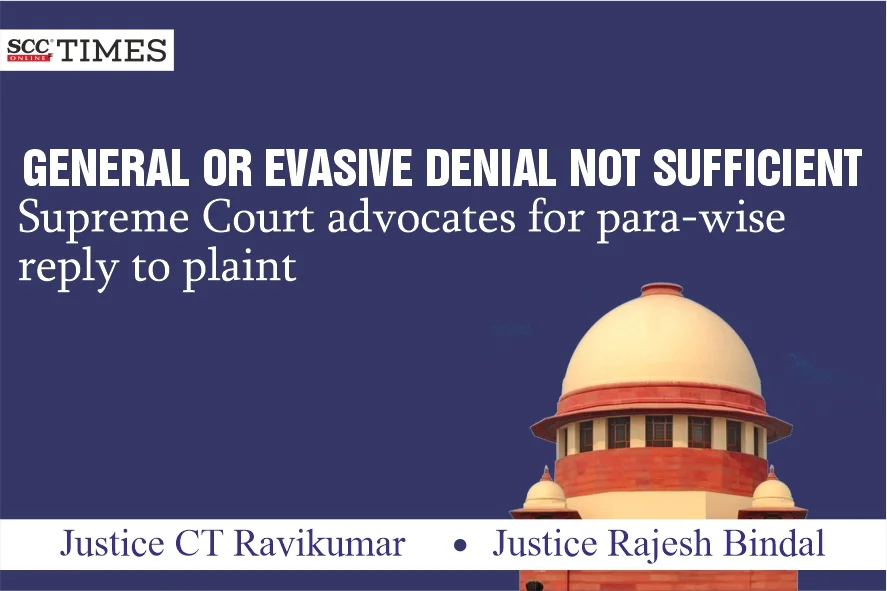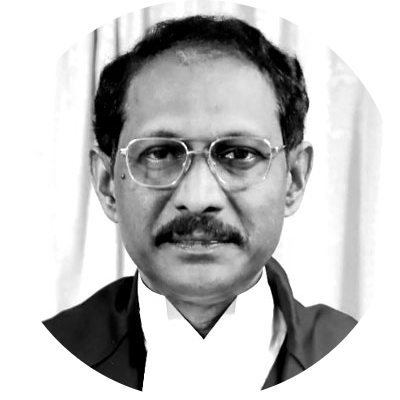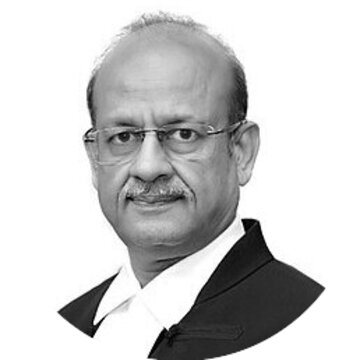Supreme Court: In a matter pertaining to the genuineness of a registered Will dated 9-10-1984, executed by the testator in favour of his brother’s daughter without any mention of his widow or daughter in the same, the Division Bench of CT Ravikumar and Rajesh Bindal*, JJ. found the same genuine and not suspicious. While deciding the matter, the Court advocated for para-wise replies to the plaints in order to save time for Courts.
The brother’s daughter (respondent herein) filed a suit for declaration and injunction which was decreed by the Munsif Court holding the Will to be genuine. The same got reversed by the First Appellate Court, which got set aside in second appeal leading to restoration of decision of Munsif Court by the High Court. The defendant in the original suit was the widow of the testator, who was the testator’s third wife, and his two wives had expired without any children.
As per the testator’s widow, he had 8 acres of land besides three houses. By way of Will in question, the testator bequeathed approximately 3.5 acres of land (value of suit property estimated to be about Rs 16,000) in favour of his brother’s daughter, stating her to be like his daughter.
Court’s Analysis
The Court perused the documents placed on record and according to the brother’s daughter’s statement, the testator’s health was fine except for having asthma and cough and denied drinking habit or being bed-ridden for 3 months before executing the Will. Another person, being the attesting witness to the Will stated of having inquired about the testator’s health who told about having some cough problem and otherwise suffering from TB. Another witness in the Sub-Registrar’s office stated about the testator having cough at the time of execution of Will. Even the scribe of the Will mentioned about testator having cough at the time of execution of Will and otherwise in good physical condition. On the other hand, the testator’s widow stated about testator suffering from lever wound, dysentery, suffered very much and was not in good physique three months before his death and was also bed ridden, and that she was taking care of him.
Based on aforementioned witness evidence, the Court did not find about testator not being in senses not to understand his welfare or take correct decisions and expressed that the Will could not be held suspicious on the ground of testator’s alleged ill health at the time of execution.
The Court further mentioned the Scribe who had stated about witnessing the testator putting his thumb impression on the Will, which was registered in the office of Sub-Registrar, and the testator on enquiry told him that his brother’s daughter can take the suit property and the other properties can be taken by his wife and daughter. The Court expressed that “This shows that even at the time of execution of the Will, the testator was fully conscious of the welfare of his widow and minor daughter as sufficient property was left for them.”
The Court looked into another statement of witness to the Will who stated about the testator being very well known to him disclosed that the Will was written under a tree, details were given by the testator, and after the same was written, he asked the scribe to read over the same, and put his thumb impression only after hearing and being satisfied by the same. It was stated that the Will was written without compulsion and in good consciousness. When the testator was asked whether he had any legal heir, he told that ‘as per his desire alone the Will was written’.
The Court took note of the fact admitted by the appellants that the property bequeathed was merely a part of testator’s entire property, reflecting that the balance property was in their possession, taking care of the interest of the natural legal heirs. The Court further noted that the appellants were not living with the testator for quite some time as admitted regarding their absence at the time of execution of Will or when the testator died, and that the expenses of testator’s last rites were borne by the brother’s daughter’s husband (testator’s brother’s son-in-law), who was taking care of testator’s land. The Court further highlighted that there was “nothing on record to suggest that the appellants were taking care of the property left by the testator immediately after his death or that any steps were taken by them to get the same mutated in their favour.”
Based on such evidence, the Court did not find any error in the High Court’s decision holding the Will genuine and not surrounded by any suspicious circumstances. The Court upheld the testator’s consciousness about having a wife and a minor child, whose interest had been taken care of by leaving part of the property for them.
Court’s comments on pleadings
The Court highlighted that the plaint filed by the respondent in the instant matter contained 10 paragraphs besides prayer, while the written statement filed by the appellants did not contain a para-wise reply but depicted their own story containing 15 paragraphs besides prayer. The Court expressed that “in the absence of para-wise reply to the plaint, it becomes a roving inquiry for the Court to find out as to which line in some paragraph in the plaint is either admitted or denied in the written statement filed, as there is no specific admission or denial with reference to the allegation in different paras.”
The Court referred to Order VIII Rules 3 and 5 of the Civil Procedure Code, 1908 (‘CPC’) regarding specific admission and denial of the pleadings in the plaint with reference to Badat and Co. v. East India Trading Co., 1963 SCC OnLine SC 9 and Lohia Properties (P) Ltd. v. Atmaram Kumar, (1993) 4 SCC 6. The Court clarified that “a general or evasive denial is not treated as sufficient.” It further added that “In the absence thereof, the respondent can always try to read one line from one paragraph and another from different paragraph in the written statement to make out his case of denial of the allegations in the plaint resulting in utter confusion.”
The Court expressed all such aspects due to regularly facing the situation where there are no specific para-wise replies given in the written statement/counter affidavit filed by the respondents, explaining such a correction may streamline the working.
CASE DETAILS
2024 SCC OnLine SC 227 Thangam Navamani Ammal |
Advocates who appeared in this case For Appellant: For Respondent: |
CORAM :









